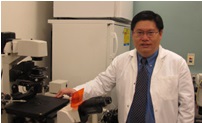
David Jin
Hematologist-Oncologist | Hematology & Oncology
6 Clinton Court Staten Island New York, 10301About
David Jin, MD, PhD, is a well-versed clinical-scientist in hematology, oncology and regenerative medicine with over a decade of experience in his field. He maintains a private medical office, serves as Chief Medical Officer at BioTime, Inc., and Chief Medical Officer at OncoCyte Corporation. Dr. Jin also acts as a Senior Translational Scientist at the Howard Hughes Medical Institute and the Ansary Stem Cell Center at Cornell. Prior to his current endeavors, Dr. Jin worked for the Food and Drug Administration in the United States as Medical Reviewer at the Oncology Product Development Division. He also was Chief Consultant/Advisor for various biotech/pharmaceutical companies regarding hematology, oncology, immunotherapy and stem cell-based technology development. Dr. Jin has been Principle Investigator in more than 15 pre-clinical and clinical trials, as well as author/co-author of over 80 peer-reviewed scientific abstracts, articles, reviews, and book chapters. He received his clinical training and subsequent faculty tenure at the New York-Presbyterian Hospital (the teaching hospital for both Cornell and Columbia Universities) in the areas of internal medicine, hematology, and clinical oncology. He received was honored as Top Chief Medical Officer in 2012.
Education and Training
SUNY Downstate
MD
PhD
Provider Details
Areas of expertise and specialization
Faculty Titles & Positions
- Speaking on Research and Development of Stem Cell Cancer Therapy and Traditional Medicine -
- Senior Clinician Scientist, Ansary Stem Cell Institute and Howard Hughes Medical Institute -
- Cofounder of the Center of Excellence in Translational Medicine, Corey Institute of Biomedical Research -
Awards
- Top Chief Medical Officer, 2012
Fellowships
- New York Presbysterian Hospital (Hematology and Oncology)
Articles and Publications
- 30 Peer Reviewed Articles (including Nature, Nature Medicine, Cell, PNAS, JCI)
Areas of research
- Translation research in stem cell biology, cancer and vascular medicine. Principle investigator in more than 15 pre-clinical and clinical trials
Areas of research
Translation research in stem cell biology, cancer and vascular medicine. Principle investigator in more than 15 pre-clinical and clinical trialsDavid Jin's Practice location
David Jin's reviews
Write ReviewRecommended Articles
- Microsoft Co-Founder Paul Allen Beats Lymphoma Twice
Beating any type of cancer is a major feat in itself, but billionaire and Microsoft co-founder Paul Allen has defeated lymphoma not once, but twice.Paul's storyNeedless to say, being the co-founder of Microsoft is a pretty big deal. As an American digital pioneer, Paul has been on top of the world....
- Overcoming Lymphoma: A South Philly Student's Story
In April of 2018, 18-year-old Alexis Carine was diagnosed with Hodgkin’s lymphoma (HL), a blood cancer that begins in the lymphatic system. Her diagnosis was stage II HL, a cancer found in two or more lymph node areas, and both are either above or below the diaphragm (the muscle located just...
- 'Sophie the Brave' Fights Childhood T-Cell Lymphoma
The story of 2-year-old Sophie Skiles and her arduous battle with T-cell lymphoma pulls at one’s heartstrings while also causing one to marvel at the faith of her Mom, Shelby.The public first learned of Sophie when a newscast about her was posted online October 20, 2017. (KLTB/abc) It soon made it...
- How is Multiple Myeloma Diagnosed?
Various tests are conducted for the diagnosis of multiple myeloma since one result of a laboratory test cannot diagnose it alone. A number of factors like the history, complete body check-up, diagnostic test reports and symptoms of the patient are taken into consideration to get a proper diagnosis...
- Morphos Declared a "Breakthrough Therapy" for Lymphoma
MorphoSys’s main objective is to design exceptional and unique biopharmaceuticals, all designed to enhance the lives of patients suffering from severe or life-threatening conditions.The human body has two types of lymphocytes that can develop into lymphomas: B lymphocytes (B cells) and T...
- Potential Causes of Leukopenia
IntroductionA decrease in the number of white blood cells (WBCs) is referred to as leukopenia. There are several causes for leukopenia. It may be due to certain drugs, cancer, radiation and chemotherapy for cancer, stem cell transplant, surgery, steroids, or autoimmune disorders. The immune system...
Nearest Hospitals
CAREPOINT HEALTH - BAYONNE MEDICAL CENTERl
29 EAST 29TH ST BAYONNE NJ 7002STATEN ISLAND UNIVERSITY HOSPITALl
475 SEAVIEW AVENUE STATEN ISLAND NY 10305




